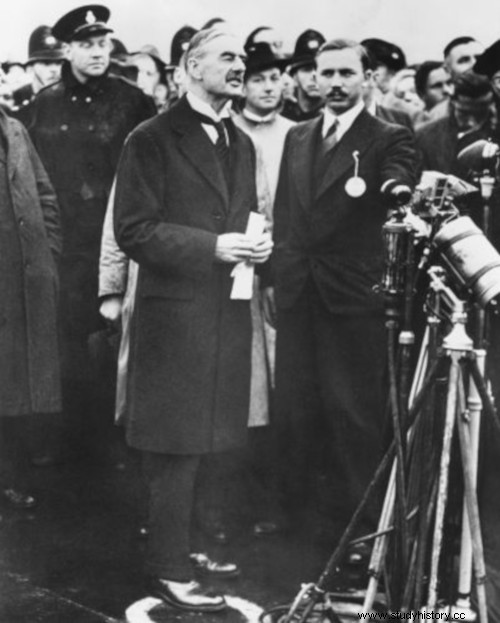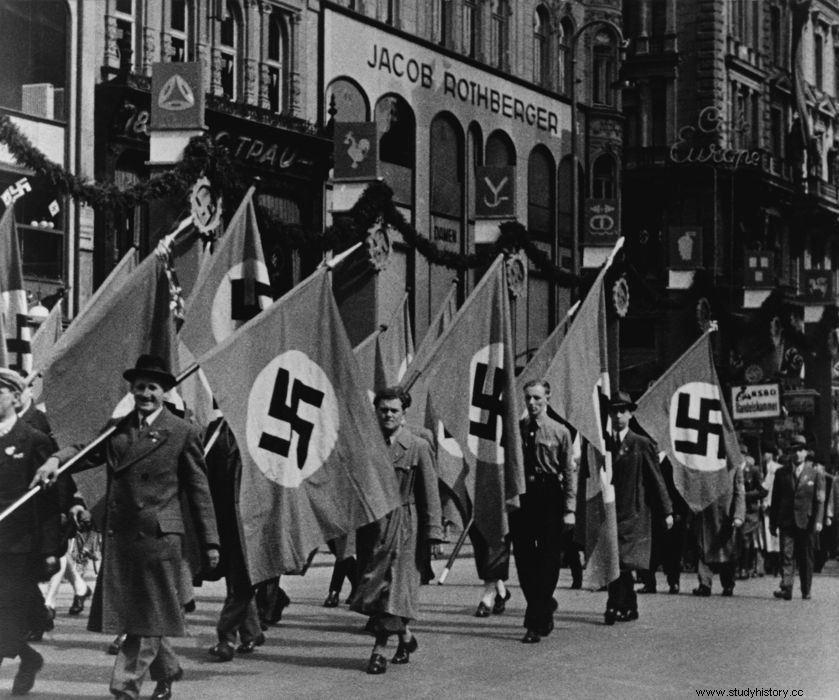
Munich Conference is the name by which a meeting that took place in September 1938 and was attended by the leaders of the following nations:Germany, Great Britain, France and Italy. At this meeting, issues related to the crisis involving the interests of Germany, ruled by Adolf Hitler, were discussed. in a region of the territory of Czechoslovakia:the Sudetes .
During this meeting, the British and French leaders put into practice something that became known as “policy from appeasement ”, which fully corresponded to Hitler's interests (in the territorial question). This policy was applied to prevent a new war from breaking out on the European continent.
See also: Battle of Berlin and the fall of Nazism
German expansionism
The holding of the Munich Conference was the result of a crisis caused by the expansionist policy that Nazi Germany put into practice from 1938 onwards. This expansionism resulted from one of the pillars defended by the Nazis :the formation of “space vital ” (lebensraum, in German).
The idea of “living space” emerged in Germany in the 19th century and was based on a conception existing in that society that the Germans (Germanic) were a “superior people”. ”. For this reason, Germans had the “right” to form an empire in territories that had historically been inhabited by Germans. This empire would be constituted mainly at the expense of the survival of the Slavs, an ethnic group that originally inhabited Central and Eastern Europe.
The construction of this “living space”, as Adolf Hitler well knew, could only be accomplished through intimidation and the use of force . In the early 1930s, however, Germany was considerably far from that goal, as the German economy was in shambles from defeat in World War I and the Great Depression, and because the country did not have sufficient military strength to do so.
In order to build “living space”, Hitler promoted the reorganization of the German army, defying the provisions of the Treaty of Versailles, which put an end to the First World War and which made harsh impositions on Germany, blaming it entirely for the conflict. The need for a well-prepared military force obviously served to frighten neighboring nations and, if necessary, to obtain conquests on the basis of force. The reorganization of the German army began in 1934/1935 and was carried out gradually.
Germany's first move to build "living space" was against Austria . In the Austrian case, Germany did not have many difficulties in annexing the country, since Austria was ethnically formed by a population of Germanic origin. After the First World War, attempts had already been made to annex the country , but were unsuccessful.
In the 1930s, as Germany prospered economically under the Nazis, the agenda resumed. The Austrian government came under pressure from Adolf Hitler and the Nazi Party of Austria. TheGermans invaded Austrian territory in 1938 and, in the same year, they organized a referendum that ratified the annexation of the country to German territory. This became known as the Anschluss .

Nazi parade held in Vienna, Austria, in celebration of the Anschluss (annexation of Austria by Germany) in 1938.*
Until that moment, the English and French watched everything passively and did not question, even with the provisions of the Treaty of Versailles being challenged by the Germans. This posture reflected the fear existing that their actions against the Germans would lead to the start of a new war on the mainland.
Also read: Operation Barbarossa
Sudetenland Crisis
After having annexed Austria to Germany's territory, Hitler turned to Czechoslovakia and disappointed those who believed that, after Austria's annexation, German ambitions over other territories would be contained. The interest of the Nazis in Czechoslovakia set fire to the internal dispute that existed in that country between Czechs and Germans.
The population of Czechoslovakia was mostly Czech, but there was a German minority, which was mainly concentrated in a region called the Sudetes . The relationship between the Czech and German population began to become troubled in the 1930s, as a result of the 1929 Crisis, which greatly affected the financial situation of the German Sudetenland (as they were called), and due to the strengthening of the Nazi Party in Germany. .
During the 1930s, Germany began funding extremist groups of Germans in Czechoslovakia and began running advertisements denouncing alleged crimes committed by Czechs against Germans. These actions by Germany mobilized the German population living in the Sudetenland and led to ideas of secession (separatism ) gained strength in Czechoslovakia.
Germany's action was publicized in Diplomacy as a way of guaranteeing the protection of the German population in the Sudetenland, but Adolf Hitler's real interest was economic . Czechoslovakia had a highly developed industrial park, especially in the production of war items, and was located largely in the Sudetenland. In addition, the country had skilled labor and rich reserves of coal and iron.
The Germans' attacks on Czechoslovakia caught the attention of the British and French, mainly because the Czechs had an agreement with the French for mutual cooperation in the event of war. The decision to intervene in the situation was taken by Neville Chamberlain , British Prime Minister, and happened because of a speech given by Hitler on September 12, 1939.
In that speech, Hitler threatened to start a war if the Sudetenland question was not resolved by separating the Sudetenland from Czechoslovakia. From there, Chamberlain requested a meeting with Hitler.
Munich Conference
Prior to the Munich Conference, two meetings were organized between Hitler and Chamberlain, but an agreement could not be reached because Hitler's demands were too high. Richard J. Evans states that British and Czechs were preparing for war after negotiations failed |1| .
The war was only avoided because Hermann Göring, a German officer, made an effort and organized a meeting, which became known as the Munich Conference, without Hitler's consent. Göring's action took place because he and many other German officers feared that a war would break out at that moment, as they claimed that Germany was not in a position to withstand a conflict.
Göring sent invites to Neville Chamberlain , British Prime Minister; Édouard Daladier , French Prime Minister; Benito Mussolini , ruler of Italy; and Adolf Hitler , ruler of Germany, who was persuaded to participate by Göring. No representatives from Czechoslovakia were invited to the meeting.
The conference took place on September 29, 1939, in Munich (German city), and lasted thirteen hours. At the end of that period, Hitler agreed to put an end to the war threats he had made earlier, the Sudetenland passed into German possession, and Hitler signed a term drawn up by Chamberlain in which he pledged to guarantee peace on the European continent. P>
The policy imposed by the British of granting terms that pleased the Germans in order to avoid war became known as the “policy of appeasement ”. This policy was carried out at the expense of the sovereignty of Czechoslovak territory. This policy, however, analyzed in retrospect, was a failure because Hitler continued his expansionist policy and ordered, in September 1939, the invasion of Poland, which started World War II.
|1| EVANS, Richard J. The Third Reich in Power. São Paulo:Planet, 2014, p. 755.
*Image Credits:Everett Historical and Shutterstock
